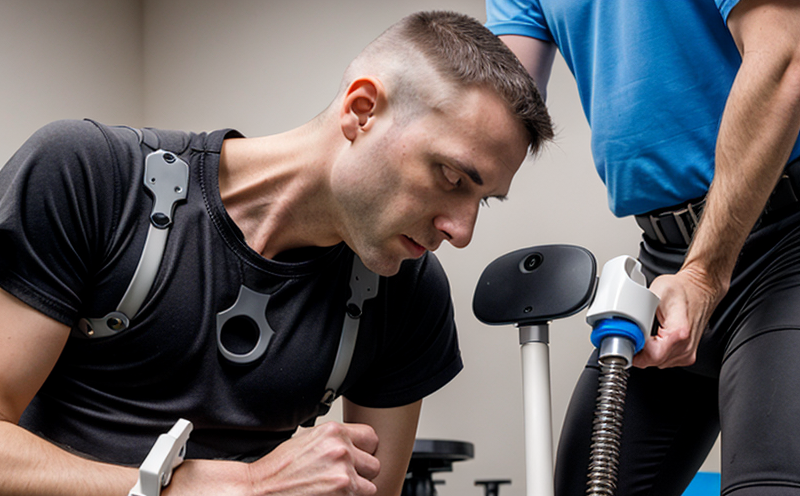ASTM F1717 Static Compression Bending Test for Spinal Implants
The ASTM F1717 test is a critical procedure used in the medical device industry to evaluate the static compression and bending properties of spinal implants. This standard, developed by ASTM International, provides a method to measure how well these devices withstand compressive forces while maintaining structural integrity during bending actions.
Spinal implants are designed to replace or augment damaged vertebrae and provide support for the spine. The success of such devices depends on their ability to handle the biomechanical stresses found in the human body. Therefore, rigorous testing is essential to ensure that these implants can perform reliably under expected loading conditions.
The ASTM F1717 test simulates the mechanical stresses experienced by spinal implants during surgical implantation and post-surgical use. It helps manufacturers identify potential weaknesses or flaws early in the development process, ensuring that only safe and effective devices reach clinical environments.
During this test, a sample of the spinal implant is subjected to both compressive loads and bending moments. The apparatus used typically consists of a testing machine capable of applying controlled forces and rotations. Specimens are prepared according to specified dimensions outlined in ASTM F1717, which ensures consistency across different laboratories.
The test procedure involves several steps: initial setup, application of load and rotation, monitoring of deformation, and evaluation of failure criteria. Compliance with ASTM standards guarantees that the results obtained from this testing method are reliable and comparable among various manufacturers.
Understanding the specific requirements and nuances of ASTM F1717 allows us to provide accurate and consistent testing services for our clients in the medical device industry. By adhering strictly to these guidelines, we ensure that every test conducted meets international standards, enhancing trust and confidence in your products.
| Test Parameter | Description |
|---|---|
| Load Application | The sample is subjected to a specified compressive load. |
| Bending Moment | The sample undergoes controlled bending at a specific angle. |
| Deformation Monitoring | Continuous measurement of displacement and strain during the test. |
| Failure Criteria | Detection of structural damage or permanent deformation exceeding acceptable limits. |
Industry Applications
The ASTM F1717 test finds extensive application in the medical device industry, particularly for spinal implants. This includes various types of devices such as pedicle screws, rods, and interbody fusion cages. By evaluating these components under simulated surgical conditions, manufacturers can ensure that their products meet stringent safety and efficacy requirements.
Additionally, this testing method is useful for assessing the durability and reliability of new designs before they enter clinical trials or mass production. It also aids in identifying any design flaws or material issues that may affect performance during use.
The results from ASTM F1717 tests play a crucial role in regulatory submissions and quality assurance programs. Regulatory bodies like the U.S. Food and Drug Administration (FDA) often require compliance with such standards to approve medical devices for market release.
Furthermore, insurance companies may request proof of successful testing as part of their underwriting process when insuring patients undergoing spinal surgeries involving these implants.
Quality and Reliability Assurance
The ASTM F1717 test is integral to quality assurance programs within the medical device industry. It serves as a key component in ensuring that spinal implants are safe, effective, and reliable under real-world conditions.
By incorporating this testing into their manufacturing processes, companies can demonstrate compliance with internationally recognized standards like ISO 10993-6, which specifies biocompatibility evaluation methods for medical devices. This not only enhances the reputation of the company but also builds trust among healthcare providers and patients.
The test results provide valuable insights into how well the implant will perform over time, helping to minimize post-operative complications and improve overall patient outcomes. Regular testing ensures that any changes made during product development do not compromise safety or effectiveness.
Moreover, consistent adherence to ASTM F1717 helps maintain high standards throughout the supply chain, from raw material suppliers through to final assembly plants. This collaborative approach fosters innovation while maintaining quality control at every stage of production.
Customer Impact and Satisfaction
The ASTM F1717 test directly impacts customer satisfaction by ensuring that spinal implants are safe, effective, and reliable. When patients receive devices that have undergone rigorous testing according to these standards, they can feel confident in their choice of treatment.
For healthcare providers, the availability of high-quality spinal implants supported by comprehensive test data enhances surgical planning and execution. This leads to better patient outcomes, reduced complication rates, and overall improved satisfaction with care.
From a regulatory perspective, compliance with ASTM F1717 helps manufacturers navigate complex approval processes more efficiently. It also demonstrates commitment to excellence in product development, which is increasingly important in today's competitive market environment.
In summary, the ASTM F1717 test plays a vital role in enhancing customer trust and satisfaction by providing robust evidence of device safety and effectiveness. This ultimately contributes to positive experiences across all stakeholders involved in spinal implantation procedures.





